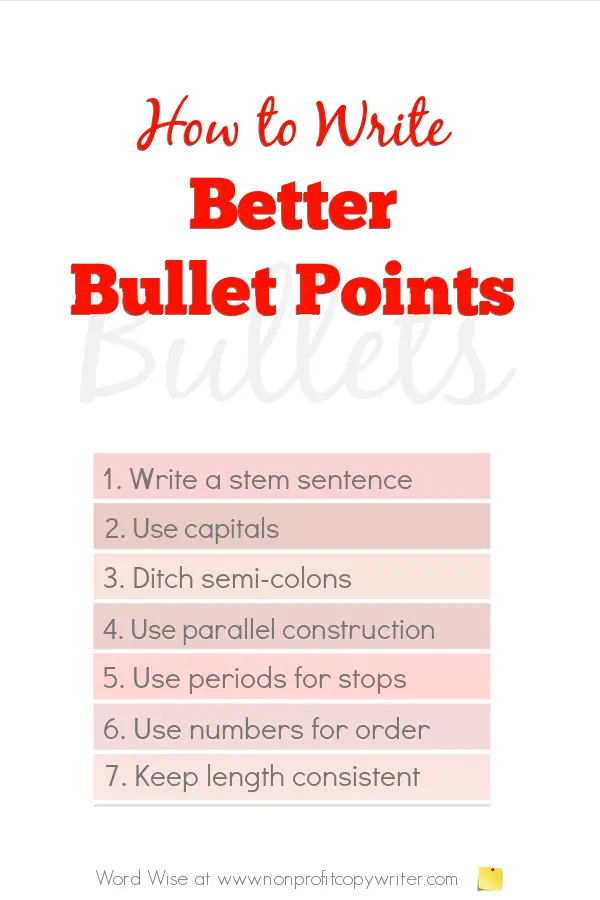Save Time: Get 5 Simple Writing Tips
you can put to use in 10 minutes
How To Write Better Bullet Points
Award-winning writer Kathy Widenhouse has helped hundreds of nonprofits and writers produce successful content , with 750K+ views for her writing tutorials. She is the author of 9 books. See more of Kathy’s content here.
Updated 1.13.26
Lists simplify a reader’s experience. When you write better bullet points in bulleted lists, you make today’s information overload manageable for readers. “Good business writing seeks to make information easy to understand,” says business writing trainer Mary Cullen.
The indented, short phrases, preceded by small dots or numbers, were originally confined to web pages, sidebars, and PowerPoint presentations. But these days bulleted lists are everywhere. You’ll find them in blog posts, scattered in business reports and articles and books – even in text messages.
Why? Because lists are a quick read. People like concise content. A list helps organize information in their minds.
Yet somewhere along the way, bulleted lists got more complicated. Sure, they are still set apart by white space. But now, bulleted lists have morphed into strings of sentences muddled with punctuation and confusing organization.
Buck that trend and write better bullet points. Do that and you bring order to information noise. And readers will become your die-hard fans because you’ve made their life easier.
7 Tips for Writing Better Bullet Points
1. Write a lead-in statement (“stem” statement)
Bullet points highlight key ideas of a single topic. Lead into a bulleted list with a statement that identifies what type of information the list will include. If you find that one of your bullet items doesn’t fit or advance your stem statement, leave it off the list and place it elsewhere in your content. A lead-in statement (like this one) should:
- Address a single topic
- Act as an introduction or summary sentence
- Can be a half sentence or complete statement
(See what I mean?)
2. Use capitals to start each bullet
“But capitals are used to start sentences or for proper nouns!” True. But what is the point of a bulleted list? Scannability. Capitalized items make your list easier to skim – even if individual items on the list are single words or phrases or complete your stem sentence.
3. Ditch the semi-colons
You may see bullet lists in which each item ends with a period or even a semi-colon, like this:
- Create bullet lists with consistent punctuation;
- End each item with a semi-colon, because bullets are actually a series;
- Close the bulleted list with a period.
The AP Stylebook (recognized as the leading guide for business writing, digital writing, and journalism) scraps the semi-colon at the end of a bullet point. Extra punctuation clutters the list. Leave out the semi-colons and you allow your reader to scan content easily.
4. Use sentences or phrases (but not both)
It’s a question of consistency. Editors call it parallelism. If you start a few of your bullets with a verb but throw in one or two that start with a noun, you’re not just annoying to the editorial gremlins. You also confuse your reader. Take a look:
- Be consistent when writing bullet points
- Create parallel construction at the start of each bullet
- Choose either fragments or sentences, but not both
- Mixed items are confusing in bulleted lists
While the first three items start with a verb, the last one starts with a noun. The rhythm is odd, isn’t it? Write better bullet points using a parallel construction, like this.
- Be consistent when writing bullet points
- Create parallel construction at the start of each bullet
- Choose fragments or sentences
- Use parallelism to avoid confusing your reader
5. Use a period when you need a full stop
Confession: I avoid periods at the end of each bullet point when each item is short. (See my bullet lists above.) Even the grammar police agree that single words or short phrases in bullet points don’t need a period. Longer bullet points that act like sentences? Sure, use periods.
But just what is “longer”? My rule of thumb: bullet list items that are longer than one line and that complete the stem sentence need a period.
6. Use numbers when order matters
Your list is a set of steps. Or your list is from biggest to smallest, cheapest to most expensive, lowest to highest. In these instances, use numbers instead of dots or another symbol.
7. Keep each bullet point similar in length
Say you’ve got a couple of bullets that are 3-5 words long and one that’s 10-12 words long. Edit the long one. Divide it in two or simplify the language so it’s roughly the length of the others.
Remember your goal? You want to write better bullet points to simplify your reader’s experience. Uniformity helps. So does consistency. Writing better bullet points may not be the most exhilarating part of content creation, but …
- It gives your writing clarity.
- It streamlines your reader’s experience.
- It sets you apart as a good writer.
More Copywriting and Content Writing Basics
10 Simple Writing Tips for Beginners (and Seasoned Writers) ...
How To Get Ideas for Writing – and Never Run Out ...
50 Copywriting Terms Every Writer Should Know ...
How to Hit a Bulls-Eye with Bullet Points ...
Parallel Construction Explained: A Mark of Quality Content Writing ...
How to Write a Sidebar that Adds Value to an Article ...
Self-Editing Tip: Start a sentence with the subject ...
6 Secrets to Effective Subheads ...
Return from How to Write Better Bullet Points to Nonprofit Copywriter home
As an Amazon Associate I earn from qualifying purchases.
Share This Page

Named to 2022 Writer's Digest list
BEST GENRE/NICHE WRITING WEBSITE


Stop Wasting Time!
Grab your exclusive FREE guide, "5 Simple Writing Tips You Can Put to Use in 10 Minutes or Less"












